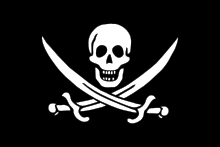Piracy
Piracy can mean different things; it can be a crime that is committed. A human on a ship at sea is called a pirate and usually has small, fast boats. Pirates use such boats to attack other ships, which are usually large cargo ships.[1]

For as long as ships have sailed the sea, there have been pirates. Piracy still happens often in the Gulf of Aden, mostly by Somali pirates.[1] Ancient Egypt and the Romans, Medieval kings, and the British Empire dealt with pirates. Fighting pirates has sometimes been one of the most important roles of a navy.
Modern
[change | change source]Modern pirates usually climb onto ships to get money. In the process, they may kill the crew or hold it for ransom. In a very few cases, they may also take over the ship and sell its cargo.
The cargo ships that travel the oceans are huge, but they usually have very few crew members working on them. Their size often makes the ships carry a lot of money in the safe. The money is used to pay the crew, to pay for the taxes to stay at a port, or to pass through a channel.
Famous pirates
[change | change source]- Edward Teach (a.k.a. Blackbeard)
- Francis Drake
- Jack Rackham (a.k.a Calico Jack)
- Jack Sparrow
- Henry Every (a.k.a Long Ben)
- Anne Bonny
- Wijerd Jelckama
- Pier Gerlofs Donia
- Captain Kidd
- Amaro Pargo
- Jean Lafitte
References
[change | change source]- ↑ 1.0 1.1 "The Dynamics of Modern Global Sea". New International Weekly. 2017-11-19. Archived from the original on 2017-12-06. Retrieved 2017-12-05.
More reading
[change | change source]- Deary, Terry (2008). Pirates (Horrible Histories Handbooks). Scholastic. ISBN 9780439955782.
- Iggulden, Hal; Iggulden, Conn (2007). "The Golden Age of Piracy". The Dangerous Book for Boys. New York: HarperCollins. pp. 146–147. ISBN 9780061243585.
- Platt, Richard (2002). Eyewitness Pirate. Dorling Kindersley. ISBN 9780751347494.
